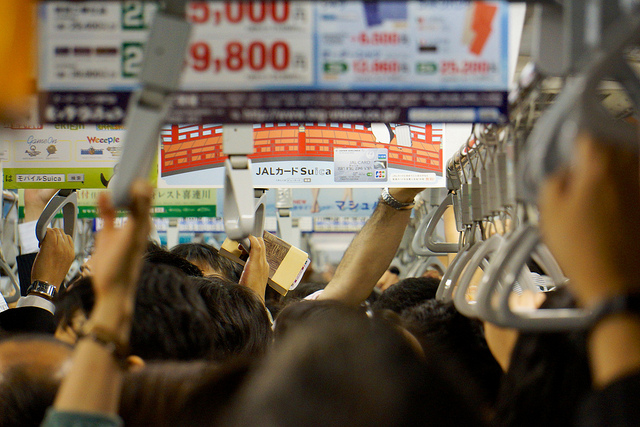
photo by bitboy
No matter what country you reside, rush hour is something you can’t avoid as long as you live in an urban area. Among others, the view of morning rush hour in Tokyo is widely known as it has been broadcasted over and over again, all over the world. Golden Week holiday has already ended this year, so congestions on expressway and bullet trains are all settled down. Some of foreign travelers who had a chance to travel in Japan during Golden Week holiday might be shocked with the chaotic situations of public transports. Japanese public transport system is well known for its efficiency but it can be extremely busy and during certain periods of a year and you may experience unexpected chaos. It is important to know about Japanese holiday season before planning your travel schedule.
Weekday rush hour: Trains
If you live in a busy Japanese city like Tokyo, you must have experience morning and evening rush hour at least once. Morning congestion on trains is always worse and a lot more aggressive than evening one. Evening rush hour is stressful enough but it is a little different than morning. This section will pick up Tokyo as an example to explain the difference between morning and evening rush hours.
Morning
Spending an hour to just go to work every morning is quite common for Tokyo commuters. In fact, taking 2-hours to commute to work place is not very uncommon in Tokyo. Inbound trains to central Tokyo starts getting crowded after 6 o’clock and the busiest time comes between 8 and 9. As well as trains, railway stations such as Toyo, Shinjuku and Ikebukuro stations that connect many railway lines become extremely busy and crowded. On the other hand, outbound trains in the morning are have plenty of room.
Evening
Reversing morning rush, outbound trains become congested at evening. However, unlike morning rush, there is a larger range of time slot that commuters return home, so evening rush hour normally starts moderately and ends late. The peak of evening rush is normally 6 to 8 o’clock. Congestions slightly settle down after peak time but trains are still crowded. Also, inbound trains are quite busy at evening.
Weekday rush hour: Road
In suburban cities that has rather inconvenient transports, cars are main tool to commute to work and there are regular congestions on main roads after 8 in the morning and around 5-6 in the evening. In urban areas such as central Tokyo, there are regular congestions on the roads as there are more buses and other transports for commuters during 7 to 9 in the morning. But when it comes to roads in Tokyo, there are permanent traffic jams on main streets. In fact, most of traffic congestions in Tokyo are created due to insufficient infrastructure such as inadequate road capacities, car accidents or road works.
Holiday rush
In addition to everyday rush hours, you should be aware of holiday season rush when traveling to Japan. In Japan, there are 4 major long holidays: Year end and new year holiday, Golden Week (late April to early May), Obon holiday (August) and Siver Week (September). During these periods, all public transports including trains, air lines and expressways are exposed to extreme demands.
Trains
Shinkansen is the most used and busiest one among all other trains. All reserves seats are booked out during holiday seasons, of course. It is quite common that trains are 150% loaded and passengers are squashed in not only carriage rooms but also non-seating areas. Early booking is recommended if you are planning to travel to Japan during these holiday seasons as it is almost impossible to book reserved seats of Shinkansen, for both inbound and outbound lines, right before the holiday. If you are travelling with non-reserved tickets, allow plenty of time before you get on board.
Air lines
Unlike trains, air planes never become more than 100% occupied. But air lines to all directions are also booked out during holiday seasons. Flight tickets to popular destinations like Hokkaido and Okinawa are the hardest to reserve. If you want to travel to Japan by air during holiday seasons, you need to plan way ahead of time.
Expressways
Huge traffic jam on expressways is such a common view associated with Japanese holiday. Among all the expressways, Chuo Expressway and Tomei Expressway are infamous for bad holiday congestions. Traffic jams of 30km long start forming as early as six in the morning. Of course, all other expressways are busy enough for holiday traffic and even returning to an expressway from parking area can be such a hard task.
Don’t rush… well, sometimes you can’t help
Accurate operation and good services. That is how Japanese public transports are often described. But it can’t be taken for granted all the time. If you are visiting Japan for a holiday, you never want to just sit in traffic and waste your limited time. Avoiding such an unfortunate trouble is quite easy if you know peak times of Japanese public transports and roads which happen during specific time slots of a day or certain periods of a year.
